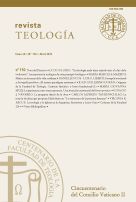Por favor, use este identificador para citar o enlazar este ítem:
https://repositorio.uca.edu.ar/handle/123456789/7322| Título: | La pregunta detrás de la obra The question behind the work |
Autor: | Navarro, Ignacio J., 1956- | Palabras clave: | Borges, Jorge Luis, 1899-1986; POESIA; BELLEZA; REVELACION; LITERATURA; ANALISIS LITERARIO | Fecha de publicación: | 2015 | Editorial: | Universidad Católica Argentina. Facultad de Teología | Cita: | NAVARRO, Ignacio J., La pregunta detrás de la obra [en línea]. Teología, 116 (2015). Disponible en: https://repositorio.uca.edu.ar/handle/123456789/7322 | Resumen: | Resumen: La poesía es minuciosa: celebra cada pequeño don que constantemente se ofrece; lo rescata, lo menciona. La poesía es también magnánima: canta los secretos vínculos que, en cada cosa, teje a todas en una sola ofrenda donde todo se reúne y alude. La poesía es sabia: pregunta y conoce al ser en sus profundidades, allí desde donde surge y se sostiene cuanto se celebra y canta por medio de la palabra poética; tiene afinidad con él, connaturalidad. La poesía, por fin, es esperanzada y abierta. Ella sabe que tiene un límite, pero que no es una clausura sino un umbral: aguarda y anhela la Palabra, vedada a la pronunciación humana, que sólo puede decirse por sí misma, aquella en la que todo, incluso el ser, tiene su consistencia. La poesía hace silencio y oye, convoca, anhela el Don que desciende y se corporiza. Hasta aquí llega el gran poeta, el hermano mayor. Entre los argentinos, quizás sea Jorge Luis Borges el que mejor adaptó el lenguaje para alcanzar este lugar, el más alto, el que lo torna a uno más cercano al misterio y, a la vez, el mejor testigo de la distancia. De estas materias, que son una sola, está hecha su poesía. Desde lo más frágil y pequeño hasta lo más inmenso y definitivo, pronunciado, encarnado. Por eso aquello de Von Balthasar: La resurrección de la carne da la razón a los poetas. Abstract: Poetry is meticulous: it celebrates every little gift that is constantly offered; it rescues it, it mentions it. Poetry is also magnanimous: it sings the secret bonds which, in each and every thing, weave them together in one single offering, in mutual unity and reference. Poetry is wise: it asks and knows Being in all its depth, in the springs of all that is celebrated and sang by the poetic word, it has affinity with it, connaturality. Lastly, poetry is hopeful and open. She knows her limits, but just as a threshold: it waits and yearns for the Word, ineffable, in which everything, even Being, has its consistency. Poetry makes silence and listens, summons, yearns for the Gift that come from on high and incarnates. This is the aim of the great poet, the elder brother. Among argentines, Jorge Luis Borges is perhaps the best in adapting language to reach this place, the highest, making us come closer to the mystery, while being at the same time witnesses to the distance. These are the matters, at bottom the one matter, poetry is made of. From what is tiniest and most fragile to what is greatest and definitive, expressed and incarnated. In words of Von Balthasar: the resurrection of the flesh proves poets are right. |
URI: | https://repositorio.uca.edu.ar/handle/123456789/7322 | ISSN: | 0328-1396 | Disciplina: | TEOLOGIA | Derechos: | Acceso Abierto | Fuente: | Teología, Tomo LII, nº 116, 2015 ISSN 0328-1396 |
| Aparece en las colecciones: | TEO - 2015 Tomo LII nro. 116 |
Ficheros en este ítem:
| Fichero | Descripción | Tamaño | Formato | |
|---|---|---|---|---|
| pregunta-detras-obra-navarro.pdf | 250,11 kB | Adobe PDF |  Visualizar/Abrir |
Visualizaciones de página(s)
141
comprobado en 30-abr-2024
Descarga(s)
114
comprobado en 30-abr-2024
Google ScholarTM
Ver en Google Scholar
Este ítem está sujeto a una Licencia Creative Commons

